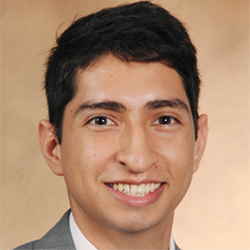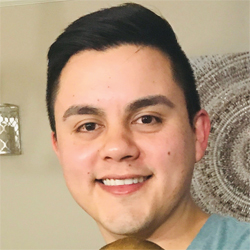SACNAS honors young scientists
The Society for Advancing Chicanos/Hispanics and Native Americans in Science, known as , hosts the annual National Diversity in STEM Conference to support scientists in every stage of their educations and careers. At the conference, attendees present research, listen to keynote speakers, participate in workshops and network.
Student research presentations are a part of the conference’s mentoring program. Undergraduates present posters, while graduate students make oral presentations about their work. They receive constructive feedback and guidance from SACNAS mentors who help aspiring scientists from all backgrounds succeed in their education and careers.
The ��Ʒ����һ��������ɫ is among the sponsors of the student presentation awards, which honor the graduate students’ presentations in a number of disciplines. Here are the awardees from the 2018 conference in San Antonio who presented research in the ASBMB-sponsored categories of biochemistry and molecular biology.
SACNAS award winners
 Jonathan Hurtado Jonathan Hurtado
Jonathan Hurtado Jonathan Hurtado
Arizona State University
Hurtado is a fifth-year Ph.D. candidate in molecular and cellular biology at Arizona State University working in in the Biodesign Center for Immunotherapy, Vaccines and Virotherapy. Hurtado presented his research on plant-produced, anti-dengue virus monoclonal antibodies’ ability to reduce antibody-dependent enhancement and to protect mice from dengue virus.
Hurtado wants to work as an academic faculty member.
 Patrick Cervantes Patrick Cervantes
Patrick Cervantes Patrick Cervantes
University of Wisconsin–Madison
Cervantes is a fourth-year Ph.D. candidate in cellular and molecular biology at the University of Wisconsin–Madison campus working in in the department of medical microbiology and immunology. His research showed that Z-DNA binding protein 1 (ZBP1) is independent of necroptosis during Toxoplasma gondii infection.
Cervantes wants to work in private or government research.
 Jose (Joey) Luis Olmos Jr. Jose (Joey) Luis Olmos Jr.
Jose (Joey) Luis Olmos Jr. Jose (Joey) Luis Olmos Jr.
Rice University
Olmos is a fifth-year Ph.D. candidate in biochemistry and cellular biology at Rice University working in . Olmos presented his collaborative work on time-resolved protein crystallography by mix-and-inject serial crystallography in the community, a National Science Foundation Science and Technology Center that, in part, aims to address the dynamic nature of proteins using X-ray free electron lasers.
Olmos wants to become a tenure-track professor because he is passionate about outreach and mentoring. “I believe science is a human endeavor that stands on the shoulders of giants,” he said, “and I find it very enjoyable and natural to give back by mentoring others on things that I’ve had to previously navigate or experience.”
Every summer, he helps recruit and mentor students for a summer research experience at Rice University that he co-directs with Phillips. Outside of the lab, Olmos enjoys reading and discovering new music.
Enjoy reading ASBMB Today?
Become a member to receive the print edition four times a year and the digital edition monthly.
Learn moreGet the latest from ASBMB Today
Enter your email address, and we’ll send you a weekly email with recent articles, interviews and more.
Latest in People
People highlights or most popular articles

In memoriam: Michael J. Chamberlin
He discovered RNA polymerase and was an ASBMB member for nearly 60 years.

Building the blueprint to block HIV
Wesley Sundquist will present his work on the HIV capsid and revolutionary drug, Lenacapavir, at the ASBMB Annual Meeting, March 7–10, in Maryland.

In memoriam: Alan G. Goodridge
He made pioneering discoveries on lipid metabolism and was an ASBMB member since 1971.

Alrubaye wins research and teaching awards
He was honored at the NACTA 2025 conference for the Educator Award and at the U of A State and National Awards reception for the Faculty Gold Medal.

Designing life’s building blocks with AI
Tanja Kortemme, a professor at the University of California, San Francisco, will discuss her research using computational biology to engineer proteins at the 2026 ASBMB Annual Meeting.

Jordahl named Gilliam Fellow
He will receive three years of funding to support his thesis research.

